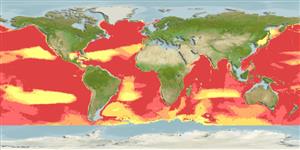>
Lophiiformes (Anglerfishes) >
Ceratiidae (Warty Seadevils)
Etymology: Ceratias: Greek, keras = horn or horned, refers to the lure projecting from the snout (Ref. 86949).
Environment: milieu / climate zone / depth range / distribution range
पारिस्थितिकी
समुद्री बैथीपिलाजिक; गहराई सीमा 400 - 4400 m (Ref. 74511), usually 400 - 2000 m (Ref. 37729). Deep-water; 67°N - 45°S, 180°W - 180°E
Circumglobal: In tropical to temperate waters. Adults (expatriates ?) found in boreal and subarctic waters. South China Sea and East China Sea (Ref.74511).
आकार / वज़न / Age
Maturity: Lm ? range ? - ? cm
Max length : 16.0 cm SL पुल्लिंग / अलिंग; (Ref. 7463); 120.0 cm TL (female); common length :77 cm TL (female)
पृष्ठीय रीढ़ (सम्पूर्ण) : 1; पृष्ठीय सौफट रेज़ (सम्पूर्ण) : 3 - 4; गुदा कांटा: 0; ऐनल सौफट रेज़: 4; जानवरों की रीड़ का जोड़: 20. Branchiostegal rays: 6 (Ref. 36494).
Maximum size observed for free living males is 1.3 cm (Ref. 10524). Males are parasitic, females oviparous with planktonic larvae (Ref. 36494). Eggs are presumably contained in floating gelatinous rafts (Ref. 36494). Minimum depth from Ref. 037729.
Life cycle and mating behavior
Maturities | पुनरुत्पत्ति | Spawnings | Egg(s) | Fecundities | लार्वा
Bertelsen, E., 1990. Ceratiidae. p. 510-512. In J.C. Quero, J.C. Hureau, C. Karrer, A. Post and L. Saldanha (eds.) Check-list of the fishes of the eastern tropical Atlantic (CLOFETA). JNICT, Lisbon; SEI, Paris; and UNESCO, Paris. Vol. 1. (Ref. 4494)
IUCN Red List Status (Ref. 130435)
Threat to humans
Harmless
Human uses
मात्स्यिकी: कोई रुचि बग़ैर
साधन
Special reports
Download XML
इंटरनेट स्रोत
Estimates based on models
Preferred temperature (Ref.
123201): 2 - 9.7, mean 3.8 °C (based on 7133 cells).
Phylogenetic diversity index (Ref.
82804): PD
50 = 0.6875 [Uniqueness, from 0.5 = low to 2.0 = high].
Bayesian length-weight: a=0.01995 (0.00906 - 0.04395), b=3.01 (2.83 - 3.19), in cm total length, based on all LWR estimates for this body shape (Ref.
93245).
Trophic level (Ref.
69278): 3.2 ±0.40 se; based on food items.
Fishing Vulnerability (Ref.
59153): High to very high vulnerability (72 of 100).
